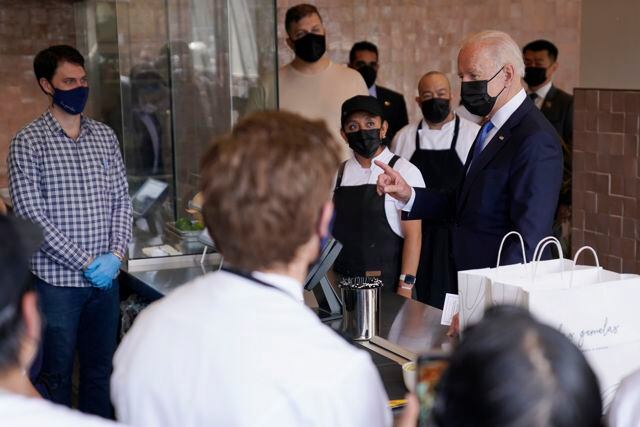By Josh Boak and Alexandra Jaffe
Setting foot in a restaurant for his first time as president, Joe Biden made a Cinco de Mayo taco and enchilada run to highlight his administration’s $28.6 billion program to help eateries that lost business because of the coronavirus pandemic.
The president went to Taqueria Las Gemelas in Washington on Wednesday and ordered lunch. The restaurant, owned in part by Mexican immigrants, was a beneficiary of a pilot version of the restaurant relief program. It went from 55 employees to seven during the pandemic, though it was able to rehire some workers through the Paycheck Protection Program that predates the Biden administration.
“When the COVID-19 pandemic struck, our nation’s restaurants were some of the first and the worst hit," Biden said in remarks Wednesday, the anniversary of Mexico's victory over French forces at the Battle of Puebla, on May 5, 1862.
The president stressed that restaurants have historically been one of the first rungs on the economic ladder, a chance to move upward that was undermined by the virus.

“For 1 in 3 Americans, a restaurant provided their first job," he said at the White House. "This industry provided more opportunity for minority managers than any other industry in America. This is an industry where the staff feels like family and often is family.”
The White House said that 186,200 restaurants, bars and other eligible businesses had applied for the program over its first two days of accepting applications. More than half of the applicants are owned by women, veterans or people from historically disadvantaged backgrounds. The aid for eateries was part of the Biden administration's broader $1.9 trillion coronavirus relief package.
The coronavirus outbreak was especially brutal for restaurants. America lost nearly 2,700 dining establishments through last summer, according to the Labor Department. About 1.8 million food service jobs also have been lost, though the sector has been gradually regaining jobs since last May.
Researchers at the not-for-profit Opportunity Insights found that consumer spending at hotels and restaurants plunged more than 60% in April 2020 compared with the start of that year. Spending is still down 4.5% compared with before the pandemic.
Under the Biden relief program, which started accepting applications on Monday, restaurants and bars can qualify for grants equal to their pandemic-related revenue losses, with a cap of $10 million per business and $5 million per location.
The program has set aside $9.5 billion for the smallest restaurants and bars, and a third of the applications were filed by businesses with annual pre-pandemic revenues of less than $500,000. For the program's first 21 days, applications from women, veterans and socially and economically disadvantaged people will have priority for being reviewed and funded.
Business owners seeking to apply for the program can receive more information at sba.gov/restaurants.
Headline updated May 5, 2021 at 3:27 p.m. ET with remarks from Biden's speech.












